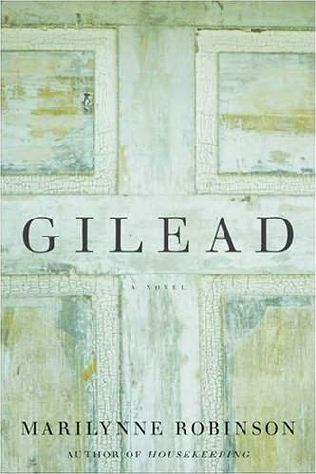 The novel Gilead by Marilynne Robinson is pretty great. (She also wrote one of my other favorite novels: Housekeeping.)
The novel Gilead by Marilynne Robinson is pretty great. (She also wrote one of my other favorite novels: Housekeeping.)The voice in Gilead is wonderfully convincing. The narrator is a minister in his 70’s who’s got a bad heart and is writing to his 7 year old son who will never probably be able to know his father really, know what his father was like. So the minister starts telling his life story which involves telling about his father who was also a minister and his grandfather who was also a minister, one who rode with the abolitionist John Brown. The book is a sort of history of religion in America across the last 150 years, talking about Karl Barth and Sartre, and talking about how God gave the American people visions back then to encourage us to break the chains that bound the Africans to the mud of slavery.
And this novel also gives a beautiful evocation of life in Kansas and Iowa since the middle of the 19th century. Robinson, who's from small town Idaho I believe, really knows how to write down what it's like to live the kind of quiet life you get in places like Charleston, Illinois, a town I lived in for 25 years. The minister's son in the novel is 7 years old in 1956. So, for me, there are also lots of charming moments that remind me of my growing up. The boy’s watching the Cisco Kid (one of my favorites) on a tiny TV set, going to movie theaters to see movies about US Marshalls in wide brimmed sombreros rounding up bad guys riding hard-tracking mustangs, etc. It does take me back.
I like the history and the prairieness and the popular culture references a lot, but I’m not sure what I make of the novel finally. It is so Christian, so God taken and God drunk. I figure that maybe Robinson is arguing that Christianity should return itself to the sort of humility it had at some point in the past when it was beset by existentialism. But I’m not sure if Christianity ever had that sort of humility. I know that the Catholicism I knew in the 50’s was never humble. It was pretty muscular. The Pope was a sort of ecclesiastical Uncle Sam rolling his sleeves back to punch the God-cursing Commie specter of Joe Stalin in the nose.
Are there any humble religions? I know there are humble people inside (and outside) religions, but humble religions? Self effacing religions? Head bowing religions?
I'm not sure.

(That's a picture of Marilynne Robinson back in 2005 when she won the Pulitzer for Gilead. If you want to read some reviews of the book, you can click on the link on the right margin of this page, toward the bottom.)










